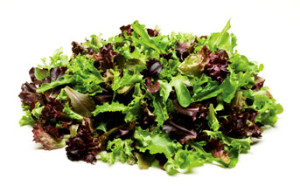I’ve become increasingly fond of the convenience of pre-washed, bagged, fresh salad mix. A staple of my weekly meals is 4oz of steak, a crumble of blue cheese, grilled mushrooms, sliced pear, a few walnuts all over a bed of 50/50 mix of pre-washed baby spinach and and mesclun mix.
I just open the bag and throw the salad on the plate.
Because there’s not much I can do, safety-wise, to it once it’s in my home. If there’s pathogenic E. coli, Listeria or Salmonella there (or others) I’m stuck with it. I’m following recommendations from a bunch of my food safety friends who reviewed the literature on cut, bagged, washed, ready-to-eat leafy greens from a few years ago.
In the abstract, they write:
The panel concluded that leafy green salad in sealed bags labeled “washed” or “ready-to-eat” that are produced in a facility inspected by a regulatory authority and operated under cGMPs, does not need additional washing at the time of use unless specifically directed on the label.
Leafy green food safety risks need to be addressed before they get to me, all I can do by washing it again is increase the chance I cross-contaminate the salad precursor in my home. My purchasing choice is based in trust that growers, packers and processors know what they are doing, and do it. But at best, they can only remove 90% of what is there with a wash.
Some folks, according to BBC News, disagree. They say things like:
‘washing foods is not 100% fail-safe, but it gives people the best chance against infection.’
and
‘we always wash everything, especially if we’re going to eat it raw. We don’t use much bagged salad or spinach, but if we did, we would definitely wash it.’
I’ll stick with the science.
But what exactly are the best ways to wash your greens? The BBC asked two food industry professionals for the best practice in food safety and hygiene when it comes to salad and vegetables.
Camilla Schneideman worked in the food industry for 18 years having run her own restaurants abroad and in the UK, and is currently the managing director of the Leiths Cookery School in London.
Rosalind Rathouse is a professional cook with more than 50 years of experience, who runs the Cookery School in central London.
Ms Rathouse advises storing all salad and vegetables in a cold environment, because it slows down the rate at which bacteria multiply.
What about ready-to-eat pre-packed salads?
Pre-packed salads are often washed in a low-chlorine solution to kill off the bugs, according Ms Schneideman, so eating straight from the bag is unlikely to harm you.
“It comes down to personal choice whether you want to give it an extra wash,” she said.
Soaking stuff all together also seems like a recipe for cross contamination. If I am washing something I’m going to rinse it down the drain.
